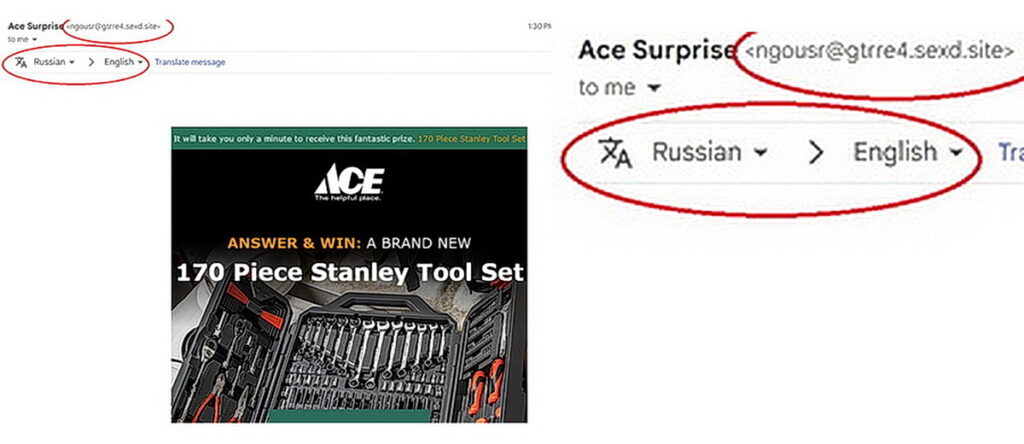In a previous article, we spoke about Covid-19 scams. Now, with Covid practically over, we are going to discuss real-life examples of some common deceptions used by nefarious individuals with the sole intention of illegally extracting money from you.

Intro – If It Walks Like a Duck…
How many times have you heard your phone ring only to see that it is a phone number you don’t recognize, but the ID says it is coming from your location? Or you get an email or text that tells you your subscription is overdue and to “click here” to update your information? Quite often, right?

Have you noticed that this is increasing and not decreasing? One might call it an epidemic of financial proportions! Well, here are a few real-life examples of how other people were getting scammed, how they responded to the scam, and what they did afterward.
We are not expecting you to become an expert on how to handle fictitious calls or emails by reading this article, but these incidents may just help you realize what is out there and help you stay on the side of caution when contacted by fraudulent individuals.
The Guy Told Me to Withdraw $140,000
– Wait What?

One might ask why any thief would be so stupid as to not anticipate the variables that can go wrong in an operation like this. Be that as it may, this is a true case of an elderly person being conned into summarizing over $140,000 in cold cash to give to an individual who told her that she needed to pay her taxes immediately and deliver the money to him. Believe it or not, these individuals exist, and they are out there!
The Details
A 70-year-old woman entered her local bank to withdraw $140,000 in cash. As per bank policy, the teller immediately advised the manager who asked the woman why she was withdrawing so much money in cash.
The woman responded that she received a call from a company she was affiliated with. They told her that she was behind on her taxes and that she needed to pay them $140,000 immediately. They said they would send someone to her house to pick up the money.

The woman, obviously scared went to the bank to withdraw the money, and the bank, obviously aware that this was a scam, contacted law enforcement, and a sting operation was set up.
When the perpetrator came to the house, he was arrested and is currently serving time in prison, which, according to reports, is not “getting out any time soon”.
They Count on Your Vulnerability

Loan Desperation
Joe, a 68-year-old married man with two children lost his job due to layoffs and was looking for work. Still, as the months proceeded, he realized that he was falling more and more behind on his debt, specifically his credit cards which were, at times, surpassing their 30-day delinquency period.
When a bank payment is delinquent for more than 30 days, an alert is sent to the credit bureaus, and it is noted on the credit report, subsequently lowering the credit rating. This can make it harder to prove creditworthiness when buying a car or applying for a loan. The man was getting very nervous with this credit score decrease. Time was of the essence for this individual.
Additionally, knowing that his credit cards were maxed out to their limit, he was worried about not having enough funds to support his household and he knew he had to do something about this fast, so he went online and searched for debt consolidation loans. He responded to a few of the listings that showed up. One of them was a website that looked for companies that listed a variety of companies that could possibly approve a loan based on his credit score, which was under 620.
He applied to numerous offers, but they all declined him. Later that day, Joe responded to an email offering him a loan for $6,000—just the amount he was looking for!

They gave him an 800 phone number to call. He called them, and they told him that they don’t use the credit bureaus to check creditworthiness but a different method. They said the first step was to deposit money into his checking account to verify that it was a valid account.
Afraid and anxious that he wouldn’t be able to support his family under his current financial conditions, he hastily followed their instructions and gave them his bank account information.
The next morning, he noticed that $3000.00 had been deposited into his checking account, and shortly thereafter, a “financial representative” called him to verify that the money was there.
What happened next would have been obvious to many; however, Joe’s state of mind caused him to bypass this red flag and not think there was any issue with the process. This is one of the methods that scammers pray on—emotional stress!
Joe was told that he needed to send them the money back. They requested that he go to a local store that provides wire transfers. He proceeded to go to the local Rite Aide down the block from him; however, it was 8:45 AM, and they had not opened yet. So he went to CVS, but they also didn’t open until 9:00 AM.
The caller was persistent (another red flag) and told him to find an open store, but he told them he would prefer to wait until the store opened. While he was waiting in his car for the store to open, he thumbed through his email messages on his iPhone and saw a message from J.P. Morgan Chase – the bank where he has his account.
The message said that they were sorry to hear that money had been illegally withdrawn from his account and that they replenished the account with the $3000 that was “missing” until an investigation was completed.

Now Joe woke up. It hit him like a ton of bricks, and he realized he had been scammed. He ignored the spammer’s phone calls and drove directly to Chase.
The manager helped him place a report to their fraud department and Chase immediately withdrew the message that they received about a $3000 loss. In the end, no harm was done. Joe was saved from losing a lot of money and there was no record held against him from Chase, but had CVS or Rite Aide been open at the time, Joe would have most likely proceeded with the wire transfer.
Behind Your Bills Scare Tatic
Alexa was laid off from her job and she started falling behind on her bills. She was not that worried about her credit cards or FICO score so much as her utility bills, and she was most concerned about her electric bill.
Being two months behind on your electric bill is sure to concern even the most optimistic of people. Then the dreaded phone calls come in. Alexa is no exception to this.
But Alexa was no fool. She never answers phone calls that don’t have a caller ID, and even when the caller ID shows up, she won’t pick up if she doesn’t recognize the name of the company calling.
In Alexa’s situation, combining these two factors wasn’t enough to catch her off guard. Being delinquent on her utility bill was certainly enough to make her ill-prepared for what was to come.
The utility company called, and she answered. Why would she not? The ID showed up who it was, so she had no reason to believe it was not a fraudulent phone call.
The woman told Alexa that she was delinquent and that she needed to bring the account up to date, or her electric bill would be suspended. Alexa had no choice but to decide to use part of her mortgage money to pay for the electric bill, and she reiterated that message to the woman, who transferred her to a man who called himself “Dave.”
Dave explained to her in perfect English (no accent) the procedure where they could receive the money today by using Zelle. A quick and legitimate application where the recipient can receive money in a matter of seconds and most banks offer this method of money transfer.
Scared, Alexa complied and followed his directions. She went online to her bank app and clicked Zelle as directed by Dave. He told her that she should type in the box asking for the amount of cash to be sent with the last four digits of her utility account number and that their algorithm would read it and know how to handle it; other words, by reading the utility code, the past-due amount and only the past-due amount would be withdrawn from her bank account.
Alexa followed his directions, and the result was that it took out the amount that was listed as the code and not the past-due balance, so she ended up paying $347 more than she needed to pay.
When she told Dave what happened, he replied that this happens sometimes and he directed her to go back to the Zelle app. On the app, Alexa told him that she saw the Request Money button and asked him if she should enter the code in this box or request the exact amount that was withdrawn.
Dave corrected her and told her not to use the Request Money button but to use the Send Money button as she did before and the algorithm will correct itself and return her the amount she overpaid.
This is where Alexa drew the line. She realized that she had been scammed and hung up on Dave, not before telling him what she thought of him.
Alexa immediately contacted her bank and they initiated a return sequence via Zelle and Alexa was lucky. She had the band reverse the amount back into her bank account.
Zelle scams are on the rise and take many forms!
Conclusion
Spammers can approach you from anywhere in the world. Email, websites, and phone calls, or they could even approach you in the street. They prey on the elderly and hope their phone calls will reach vulnerable individuals, no matter what their age is.
Be wary of anything that even seems suspicious, and never send anyone any money until you are sure they are the legitimate party!





